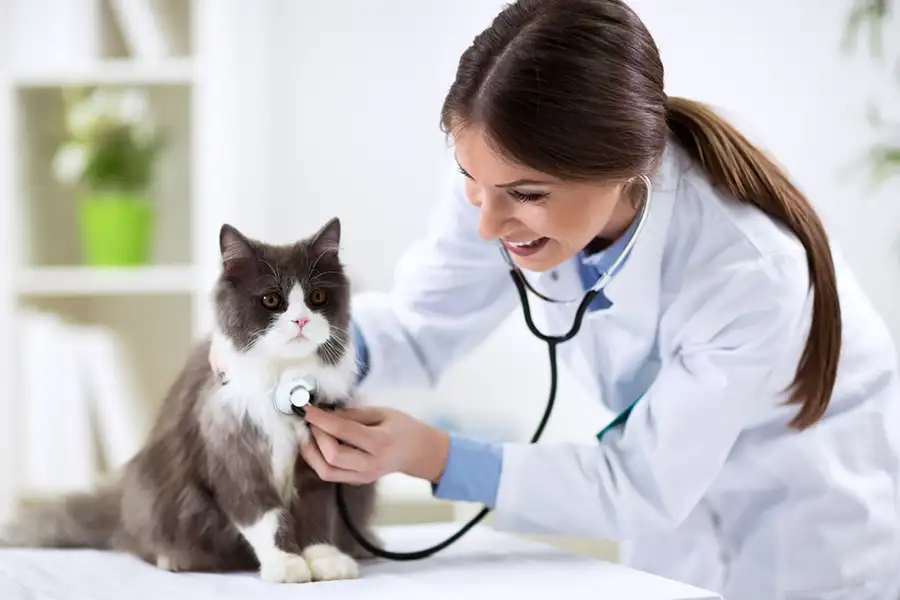The heart is a powerful muscle, but it isn’t immune to damage and illness. Our pets can also deal with heart conditions, including heart disease.
Care Center Vets wants to make sure that your pet’s heart is healthy and that you know the symptoms of heart disease.
Tips for Good Pet Heart Health
Unfortunately, heart disease isn’t preventable, but you can take other measures to keep your pet’s heart as healthy as possible. Care Center Vets’ advice includes:
- Weight management for your pet: Keeping your pet at a healthy weight is good for their overall health, but it also can reduce stress on the heart.
- A balanced, nutritious diet: A balanced diet not only aids in keeping your pet’s weight in check, but it also ensures that your pet is getting all the nutrients needed to stay healthy.
- Frequent exercise: Getting your dog adequate exercise including frequent cardiac exercise, helps keep your dog or cat healthy and happy. Consider walking, running, playing, swimming, hiking, or dog-related sports such as flyball and agility.
- Annual exams: Exams give your veterinarian the opportunity to monitor your pet’s heart. If something seems off during an annual exam, your veterinarian will be able to see the changes and possibly make an early diagnosis.
- Parasite preventatives: Flea and tick preventatives can prevent illnesses that could cause stress on the heart. Heartworm preventatives can reduce your pet’s risk for heart disease as it causes 13 percent of heart disease cases.
- Provide dental care: Dental disease is one of the most common conditions that dogs and cats face, and it has a strong correlation to heart disease, so dental health should be a top priority for pet owners.
- Knowing your breed: Some pet breeds are more prone to heart disease than others. These breeds include Maine Coon, Persian, and Siamese for cats and Cavalier King Charles spaniel, Boston terrier, and Chihuahua for dogs.
Even though you can’t prevent heart disease, you can take measures to ensure that your cat or dog’s heart is as healthy as possible for as long as possible. These tips will help you do just that. However, that doesn’t mean that you shouldn’t be able to identify the symptoms of heart disease.
Symptoms of Heart Disease
While heart disease can be genetic, 95 percent of cases are acquired. Heart disease develops due to wear and tear on the heart, as well as injury or illness. The following symptoms should prompt you to take your dog or cat to a veterinarian to see if it has heart disease:
- Dry coughing post-exercise
- Coughing that gets worse at night
- Rapid, unexplained weight loss
- Shortness of breath
- Fatigue and fainting spells
- Pale gums
- Swollen abdomen
- Depression
- Decreased appetite
Diagnosing and Treating Heart Disease
Diagnosing heart disease includes a physical examination of your cat or dog. A veterinarian will be looking for irregularities in your pet’s heartbeat and fluid in the lungs. If your veterinarian suspects that your pet has heart disease, they will likely refer you to a
veterinary cardiologist. A board-certified cardiologist will be able to run more advanced diagnostic tests to see if there are signs of heart disease. These diagnostics include:
- Blood pressure evaluations
- Echocardiograms, which are non-invasive ultrasounds that look at your pet’s heart
- Electrocardiograms, or EKG, which record the electrical activity of the heart
- Radiography or digital x-rays
Due to the severity of the disease, early detection is important, which is why it is crucial that your pet sees a veterinarian at least once a year. The earlier your pet receives treatment, the more likely that further damage to the heart can be prevented or held off.
Once diagnosed with heart disease, the veterinary cardiologist will assess the situation to see which treatment options are best for your pet. Since all pets will have slightly different problems, two dogs dealing with the same disease may have vastly different treatments; the same goes for cats.
When necessary, the veterinary cardiologist will prescribe medications that correct irregular heartbeats and improve blood flow, as well as decrease fluid build-up in the lungs. In some cases, surgery may be necessary to replace a valve or put in a pacemaker.
Diuretics may be prescribed to decrease fluid buildup caused by poor circulation. Other medications may be necessary to relax blood vessels in an attempt to help increase the flow of blood and reduce strain on the heart.
Supplements can help dogs and cats with heart disease, too. Coenzyme Q can slow the progress of heart disease, and omega-3 fatty acids can reduce the risk of heart failure. Both L-carnitine and taurine are amino acids that are good for your pet’s heart.
Depending on the condition of the heart, your pet may need lifestyle changes such as decreased exercise or a change in diet. When lifestyle changes are required, your pet’s veterinary cardiologist can help you determine what appropriate exercise for your pet looks like and the type of food your pet should be eating to stay as healthy as possible. Often dogs will be put on low sodium diets, much like humans with heart disease.
If you have any concerns over your pet’s heart health, Care Center Vets’
Dr. Megan McLane, DVM, DACVIM can help. Dr. McLane is a veterinary cardiologist that can diagnose and treat heart disease in pets. If you live in the Cincinnati or Dayton area, contact Care Center at 513-530-0911 to set up an appointment with the cardiology team.
